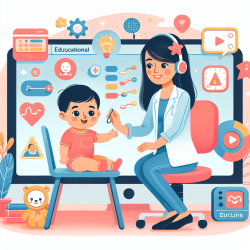As a therapist working in an educational setting, I know how important it is to use evidence-based practices to support the development of our students. Recently, I came across a fascinating study titled Does the Degree of Prematurity Relate to the Bayley-4 Scores Earned by Matched Samples of Infants and Toddlers across the Cognitive, Language, and Motor Domains? This research offers valuable insights into how the degree of prematurity affects various developmental domains, and I believe it can greatly enhance our therapeutic practices.
The study analyzed Bayley-4 data for extremely premature infants and toddlers (<32 weeks), moderately premature children (32–36 weeks), and full-term children. The researchers found that the degree of prematurity significantly impacts cognitive, motor, and language development. Here are some key takeaways and practical tips for incorporating these findings into your therapy sessions:
- Focus on Cognitive and Motor Skills: The study found that cognitive and motor skills were the most affected by prematurity. Extremely premature children scored significantly lower than both moderately premature and full-term children. Prioritize activities that enhance these skills, such as problem-solving tasks and physical exercises that improve coordination and balance.
- Language Development: Although language development was also impacted, the differences were less pronounced compared to cognitive and motor skills. Incorporate language-rich activities like storytelling, singing, and interactive reading to boost both expressive and receptive language skills.
- Early Intervention is Key: The study highlights the importance of early intervention. Premature children tested as toddlers showed better developmental outcomes than those tested as infants. This underscores the need for timely and targeted interventions to maximize developmental gains.
- Tailor Interventions Based on Degree of Prematurity: Extremely premature children may require more intensive and specialized interventions compared to moderately premature children. Use the Bayley-4 scores to guide your assessment and tailor your therapeutic approaches accordingly.
- Monitor Progress Closely: Regularly assess the progress of your students using standardized tools like the Bayley-4. This will help you identify areas that need more attention and adjust your interventions to better meet the needs of each child.
Implementing these research findings into your practice can help you provide more effective and individualized support to preterm infants and toddlers. By focusing on the areas most impacted by prematurity and tailoring your interventions accordingly, you can make a significant difference in their developmental outcomes.
To read the original research paper, please follow this link: Does the Degree of Prematurity Relate to the Bayley-4 Scores Earned by Matched Samples of Infants and Toddlers across the Cognitive, Language, and Motor Domains?










